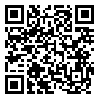Autumn 2025 (In Press)
Back to the articles list |
Back to browse issues page
1- Department of Epidemiology and Biostatistics, School of Health, Fasa University of Medical Sciences, Fasa, Iran , bpegman@yahoo.com
2- Student Research Committee, Fasa University of Medical Sciences, Fasa, Iran
3- Department of Infectious Diseases, School of Medicine, Fasa University of Medical Sciences, Fasa, Iran
2- Student Research Committee, Fasa University of Medical Sciences, Fasa, Iran
3- Department of Infectious Diseases, School of Medicine, Fasa University of Medical Sciences, Fasa, Iran
Abstract: (5 Views)
Background & Objectives: Following the global pandemic, Coronavirus Disease 2019 (COVID-19) has remained endemic in many regions of the world; therefore, examining the various factors influencing reinfection can help establish a stronger evidence base for effective prevention and control. Accordingly, this study aimed to identify predictors of COVID-19 reinfection and the associated risk factors.
Materials & Methods: A hospital-based case-control study was conducted with 147 patients in southern Iran. Information on the case group was collected, and a control group was selected. Structured interviews were conducted to obtain relevant data, which were documented in a checklist. The data were then analyzed using chi-square tests and logistic regression.
Results: The study included 74 (50.3%) men, with a mean age of 36.45 years. The control group reported a higher frequency of mask use and daily fruit consumption compared to the case group. In the univariate analysis, mask use, underlying diseases, and fruit consumption were significantly associated with reinfection. However, in the multivariate analysis, only the association with underlying diseases remained statistically significant (p = 0.031, OR = 3.445).
Conclusions: The findings indicate that underlying diseases substantially increase the risk of COVID-19 reinfection and should therefore be prioritized in prevention strategies.
Materials & Methods: A hospital-based case-control study was conducted with 147 patients in southern Iran. Information on the case group was collected, and a control group was selected. Structured interviews were conducted to obtain relevant data, which were documented in a checklist. The data were then analyzed using chi-square tests and logistic regression.
Results: The study included 74 (50.3%) men, with a mean age of 36.45 years. The control group reported a higher frequency of mask use and daily fruit consumption compared to the case group. In the univariate analysis, mask use, underlying diseases, and fruit consumption were significantly associated with reinfection. However, in the multivariate analysis, only the association with underlying diseases remained statistically significant (p = 0.031, OR = 3.445).
Conclusions: The findings indicate that underlying diseases substantially increase the risk of COVID-19 reinfection and should therefore be prioritized in prevention strategies.
Send email to the article author
| Rights and permissions | |
 |
This work is licensed under a Creative Commons Attribution-NonCommercial 4.0 International License. |




